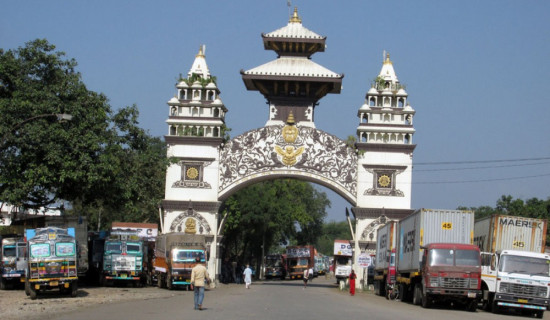- Sunday, 15 February 2026
Dance Of Discrepant Datelines
P Kharel
At casual glance, news datelines, might sound and read something routine. Without the mention of that particular slug, the message in a news item loses much meaning. In its collective representation, a dateline at the beginning of a story, at the bottom or in the course of an opening broadcast narrative suggests the extent of the operating organisation’s outlook. Dance of datelines and deadlines define and decide on the scope of news in action. Datelines can carry immense significance, for examples, eyewitness accounts, first hand narratives and on-the-spot reports. Direct quotations or sound bites from these sources strengthen the content quality.
Two content analyses of 25 Nepali publications, graded “A” by Press Council Nepal, showed how narrow the scope of deadlines was. The front pages were overwhelmingly devoted to news originating in the capital city; so did the information sources. Why the media take such lethargic approach is easier to understand. Sheer lazy attitude is the chief culprit.
Message & meaning
Poring over news items, printed or broadcast indicates the narrow scope of people, places and personalities confines the national media to the Kathmandu Valley. Decoding the data is not much of a difficulty. Media focus is atrociously too heavy on the valley. The sight placed on districts outside the valley, too, is very limited. The datelines almost always indicate that distant districts and the inner core of towns, let alone villages, suffer editorial indifference.
The national and local news outlets share many similarities. They ignore numerous newsworthy issues within their turf and responsibility. The locals forget their neighbouring towns and districts. A staggering percentage of community radio is dependent on broadcast agencies that supply news packages catering to the large, disparate groups of listeners. In the big media, the front pages and broadcast news headlines are filled with Kathmandu Valley news. Federation of Nepalese Chambers of Commerce and Industries, as a case in point, has its district branches all over the country but only a handful of them are datelined. Secondary school tournaments in the capital valley find their way to sports pages of national dailies and major TV channels whereas similar events or district level competitions rarely ever get such treatment.
If leaders and opponents make their views public in the capital, their words of wisdom draw major headlines on radio and television, and prime space in print. Were the same leaders to do the same from outside the capital valley, the chances are most likely for the event to get a drastically whittled down spot.
When two men reached the top of the world’s tallest snow-clad peak seven decades ago, the reactions everywhere were one of astonishment and warm welcome. After eight previous attempts by various groups failed, the 1953 British Mount Everest expedition achieved the crowning glory thanks to Edmund Hillary and Tenzing Norgay emerging as the first to set their feet on the summit of the tallest mountain on May 29.
The accomplishment proved to be a highly prized, breathtakingly exacting, back-breaking undertaking that was full of risks and uncertainties. The pioneer summiteers became instant heroes across the world. But their success story took four full days to be released in London, coinciding with Queen Elizabeth’s coronation on June 2. There were speculations that a deliberate delay in announcing the triumph was designed to accelerate and add to the coronation celebrations savoured all around in the once largest empire known in human history.
By the time the expedition members arrived in Kathmandu to savour their globally-inspiring glory, the British government had announced knighthood for Hillary and team leader Hunt. Subsequently, the British government announced George Medal for Norgay. At a reception the Nepal government organised to honour the team’s triumph, the senior Queen Mother presented Norgay with a purse of Rs. 10,000.
The conspicuous difference in the manner in which the two summiteers were honoured by the British government provoked unflattering comments over the “discrimination”. When consulted by London, Indian Prime Minister Jawaharlal Nehru was said to have strongly opposed to Norgay being knighted.
Scoop from the snows
Newspersons crowd and pester information sources as bees do with flowers rich in nectar. In the case of the Hillary-Norgay accomplishment, the British government secretly wished that any summit success would be most welcome especially during the time of the great excitement the coronation celebrations had generated. The reports from the Everest expedition were closely guarded. A great wall of secrecy was maintained about the mountaineers’ pace of progress.
On the day the long-awaited final ascent peaked (May 29), the coded message read: “Snow conditions bad stop advanced base abandoned yesterday stop awaiting improvement...All well”. The decoders read the message as: “Summit of Everest reached on May 29 by Hillary and Tenzing”.
The secrecy in which the development was held could be gleaned by the fact that the Indian Wireless News bulletin, at 2 pm on June 1— three days after the Sagarmatha triumph —reported that the expedition’s mission had failed. Come the new British Queen’s grand day, on June 2, the Sagarmatha summiteers’ story went flashed and splashed across the world.
Most major news items in Nepal are dominated by official briefings and speeches. The slightest of controversies are often not accompanied by specific identifiable sources. Intra-institutional issues roiled in controversy are rarely escorted by names.
Hence the traditionally discrepant datelines leave very little room for sustained interest.
The US lost its patience with majority decisions at the UNESCO at least twice. The first time was in 1984, when the superpower quit the specialised body. Britain followed suit two years later. The US returned to the UNECO fold in 2003 but again during Trump’s time, the 1984 incident was repeated.
(Professor Kharel specialises in political communication.)

















